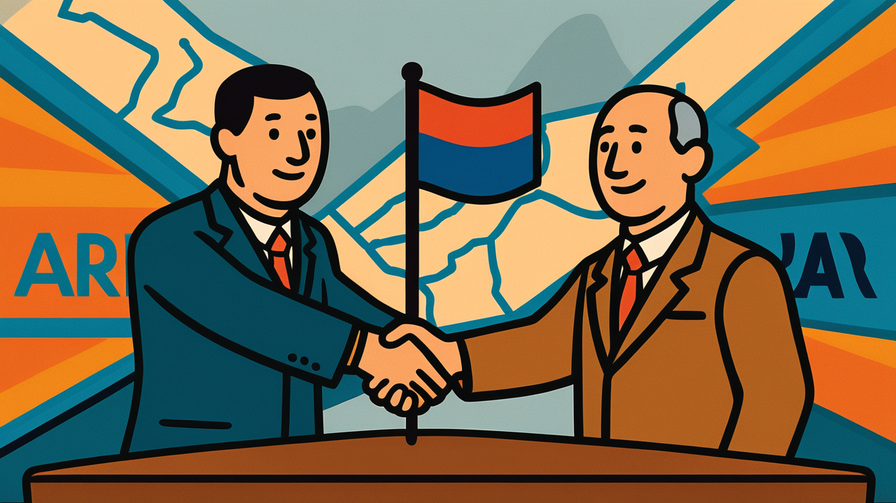[Disclaimer] This article is reconstructed based on information from external sources. Please verify the original source before referring to this content.
News Summary
The following content was published online. A translated summary is presented below. See the source for details.
Leaders from Armenia and Azerbaijan have met for direct peace talks in Abu Dhabi, United Arab Emirates, marking a potential breakthrough in one of the world’s longest-running conflicts. The meeting represents the first major diplomatic engagement since Azerbaijan regained control of the disputed Nagorno-Karabakh region in September 2023, ending three decades of Armenian control. The talks, mediated by the UAE, focus on establishing a comprehensive peace treaty, reopening transport links, and determining final borders between the two nations. Both countries have indicated willingness to move forward, with Azerbaijan seeking recognition of its territorial integrity and Armenia pushing for guarantees about the safety and rights of ethnic Armenians. International observers view these talks as potentially historic, as previous attempts at peace have repeatedly failed over the past 30 years.
Source: Global Voices
Our Commentary
Background and Context

To understand why these talks matter, imagine two neighbors fighting over a piece of land for 30 years, with thousands dying and even more becoming refugees. That’s the story of Armenia and Azerbaijan.
The conflict centers on Nagorno-Karabakh, a mountainous region about the size of Delaware. Although internationally recognized as part of Azerbaijan, it was populated mainly by ethnic Armenians who wanted to join Armenia. When the Soviet Union collapsed in 1991, this dispute exploded into war.
From 1988 to 1994, the First Karabakh War killed 30,000 people and displaced over a million. Armenia won, taking control of Nagorno-Karabakh plus surrounding Azerbaijani territories. For the next 26 years, the situation remained frozen – no peace, no war, just tension.
Everything changed in 2020 when Azerbaijan, now wealthier from oil exports and backed by Turkey, launched a 44-day war using modern drones and weapons. Azerbaijan won decisively, retaking much of the lost territory. Then in September 2023, Azerbaijan completed its victory, taking all of Nagorno-Karabakh in just 24 hours. Over 100,000 ethnic Armenians fled to Armenia.
Expert Analysis
These Abu Dhabi talks represent a fundamental shift in the conflict dynamics. For the first time, negotiations are happening from a position of total Azerbaijani military victory rather than stalemate. This creates both opportunities and challenges:
Why now might work:
1. Military reality is settled – no more arguing over who controls what
2. Both countries need economic development more than continued conflict
3. Regional powers (Russia, Turkey, Iran) are distracted by other crises
4. Young generations want to move beyond their grandparents’ wars
Major obstacles remain:
1. Deep trauma and mistrust after decades of violence
2. Domestic politics – leaders face pressure from hardliners
3. Property rights of displaced people from both sides
4. The fate of Armenian cultural sites in Azerbaijan
The UAE’s role as mediator is interesting. Unlike traditional mediators (Russia, US, France), the UAE has no historical baggage in the region but does have economic influence and good relations with both countries.
Additional Data and Fact Reinforcement
The human cost of this conflict:
– 50,000+ total deaths since 1988
– 1 million+ people displaced (both sides)
– 100,000 ethnic Armenians fled Karabakh in 2023
– 600,000 Azerbaijanis displaced in the 1990s
Economic impact:
– Armenia spends 4.3% of GDP on defense
– Azerbaijan spends 5.4% of GDP on military
– Closed borders cost billions in lost trade
– Both countries miss out on transit revenues
What peace could bring:
– Reopened railways connecting Europe to Asia through the Caucasus
– Energy pipelines avoiding longer routes
– Tourism to historical sites currently off-limits
– Reduced military spending for development
International involvement:
– Russia: Traditional Armenian ally but relationship strained
– Turkey: Strongly backs Azerbaijan, closed border with Armenia
– Iran: Worried about changing borders, has Armenian minority
– EU/US: Want stability for energy routes avoiding Russia
Related News
Recent developments affecting peace prospects:
– Armenia formally recognized Nagorno-Karabakh as Azerbaijani territory (2023)
– Armenia-Turkey normalization talks progressing slowly
– Russia’s influence declining due to Ukraine war
– Iran proposed regional cooperation platform
– EU increased engagement with both countries
Youth movements in both countries:
– Peace activists face harassment but continue working
– Joint Armenian-Azerbaijani dialogue groups meet online
– Young people more interested in Europe than continuing conflict
– Social media enabling people-to-people contact despite closed borders
Summary

The Abu Dhabi talks between Armenia and Azerbaijan could mark the end of one of the world’s most intractable conflicts. After 30 years of war, displacement, and suffering, both nations finally seem ready to choose peace over perpetual hostility.
For young Armenians and Azerbaijanis, this potential peace agreement could be life-changing. Instead of mandatory military service preparing for the next war, they could focus on education and careers. Instead of closed borders limiting opportunities, they could benefit from regional trade and connectivity. This generation could be the first in decades to grow up without the shadow of war.
However, making peace is harder than making war. Both societies carry deep wounds. Politicians built careers on nationalism. Refugees want their homes back. The parents of soldiers killed in battle seek meaning in their loss. These emotional realities can’t be solved by diplomatic agreements alone.
Success requires more than signatures on paper. It needs brave leadership willing to sell compromise to skeptical populations, economic incentives making peace more attractive than conflict, and time for new generations to overcome inherited hatred. The Abu Dhabi talks are just the beginning of a long journey from enemies to neighbors.
Public Reaction
Social media shows mixed reactions. Azerbaijani users celebrate from a position of victory while demanding Armenia acknowledge all territorial claims. Armenian users express resignation mixed with hope for normalcy, though many mourn the loss of Karabakh. Youth groups on both sides cautiously support dialogue. Hardliners denounce any compromise as betrayal.
Frequently Asked Questions
Q: What is Nagorno-Karabakh?
A: A mountainous region internationally recognized as part of Azerbaijan but historically populated by ethnic Armenians. It was the main cause of the Armenia-Azerbaijan conflict.
Q: Why did the conflict last so long?
A: Multiple factors: ethnic hatred from past massacres, strategic importance of the territory, international powers playing favorites, and politicians using nationalism to stay in power.
Q: What changed to make peace possible now?
A: Azerbaijan’s military victory settled the territorial dispute by force. Armenia, weakened and isolated, chose pragmatism over continued conflict. Both countries see economic benefits from peace.
Q: Will refugees return home?
A: Unlikely for most. Armenians who fled Karabakh fear persecution in Azerbaijan. Azerbaijanis displaced in the 1990s have built new lives. Some symbolic returns might happen, but mass return seems impossible given the mistrust.


